|
8/25/2016 Comments A Blog Commentary on Luke's Gospel, Written for Settlers in the Occupied Territories Called Canada (Part, 1)By: Dan Oudshoorn 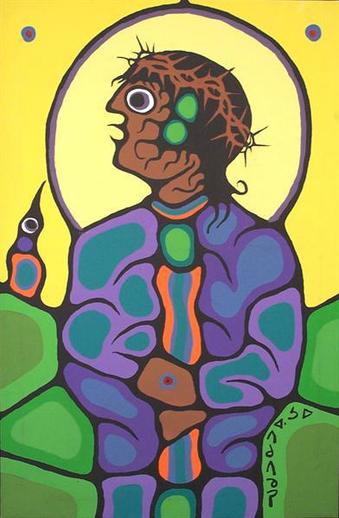 Painting by ᐅᓵᐚᐱᐦᑯᐱᓀᐦᓯ. Painting by ᐅᓵᐚᐱᐦᑯᐱᓀᐦᓯ. Note: Originally published on Dan's blog, On Journeying with Those in Exile Jesus was an Indian. If you don’t understand that, you won’t understand any of the rest of it, so you’ve got to get this first. Let me try to be clear about this. By saying that “Jesus was an Indian,” I don’t mean that Jesus was from India. India didn’t even exist back in his day, given that what we call India was actually a number of different kingdoms or empires rooted in people like the Satavahanas, or the Indo-Scythian Sakas, or the Mahameghavahanas, to name just three of about a dozen different options. So I’m not saying Jesus was a proto-Indian, as though he came from that region. Furthermore, although a fringe group of people like to say Jesus went to India to study and learn in the years we hear nothing about in the canonical Gospels (for example, in an universally discredited book claiming to offer “irrefutable evidence” and entitled Jesus Lived in India, Holger Kersten argues Jesus lived in India when he was young, where he became a spiritual master in Buddhism, and then returned there to grow old and die after he rose from the dead), that’s not what I’m saying. No, Jesus was an Indian in the same sense that the Haudenosaunee, the Anishinaabeg, the ᓀᐦᐃᔭᐤ, the Wet’suwet’en, the Sḵwx̱wú7mesh, the Tlicho, and the more than 630 First Nations in Canada are Indians. And Jesus is an Indian in exactly the same way that members of all of these nations are Indians. Because what does it mean to say that the Indigenous peoples of Turtle Island are “Indians”? Well, to begin with, it means that they are a people who have been colonized by a foreign power who gives them names not of their choosing. This applies as much to people as it does to the land. Hence, Turtle Island is no longer known as Turtle Island. It is called North America, and Canada, and the United States of America are the nations that are said to be present there (I’ll stick to Canada in what follows, as that is the land my people have colonized). And in Canada, for most of its history, the original peoples – the Onkwehonwe to use the Kanien’kehá:ka word – were not known by the names they had received from the land but by the names given by those who colonized both them and the land (although it is wrong to imply that the people and land can be separated and thought of as two distinct entities). They became Indians because that was the name given to them by the settlers who wielded power over Life and Death and who gave out the latter far more than the former.
Comments
By: Gregory Williams 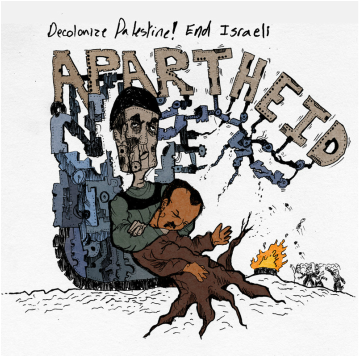 Last month, I played a support role in an anti-zionist protest of a Friends of the IDF fundraiser in Westport, Connecticut. The action unexpectedly ended in arrest, and, somewhat more predictably, was the occasion for a fierce back-and-forth in local newspapers and blogs about the IDF, the Occupation of Palestine, and the importance/inappropriateness of trying to disrupt Zionist events. My small contribution to this debate was an editorial that was circulated on several blogs and two local newspapers. In the piece, I did what I have done in several posts on Jesus Radicals and discussed Zionism as a racist, white supremacist ideology. This message, to my surprise, was almost more controversial than the initial direct action. At the time, I saw no need to defend the claim that the conversation about Zionism is, by necessity, a conversation about race. This was clearly an error on my part, given the reaction that this claim received, not only from Zionist critics, but also from skeptical supporters. It is, I have been reminded, far more common to talk about the Occupation in terms of war and peace, or human rights than in terms of race. I am not necessarily writing to change this, or to criticize other anti-zionists in any way. The last thing that our movement (or any movement) needs is a public spat over tactics or rhetoric. I wholeheartedly support anyone working for a future in which no mother is forced to give birth at a checkpoint, no child is labeled as a demographic threat from birth or forced to grow up at the point of a gun, and in which no family lives in fear of their home being destroyed by a bomb or a bulldozer. Our work is far more important than the words with which we justify it. Nonetheless, I am conscious, at this juncture, of the need to step back for a moment and offer an account of why I use the language of race to talk about Zionism. By: Derek Minno Bloom 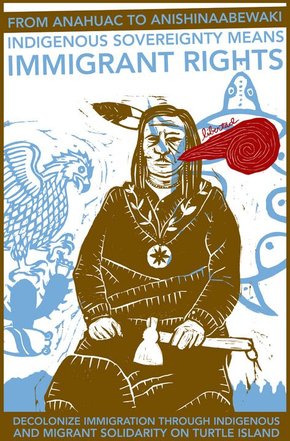 Anarchism To be clear, I identify as a Judeo-Christian and a radical, but in the last few years my politics have transformed from anarchistic politics to a more de-colonial politics. In this essay I will explain how de-colonial thought first changed my politics and then my spirituality. When I use the word de-colonial I mean thoughts and ways of living/governing without colonial rule/Western thought. Learning about visions of decolonized futures from different Indigenous folks, I realized that there is not only one way in which decolonization is envisioned. These visions include a return of land and resources, healthy rivers, return of traditional life ways and languages, a return of the buffalo and grasslands and salmon runs, a return to matriarchal societies, abolition of the Prison Industrial Complex, an end to systematic prejudice, racism, and sexual violence, and for their settler neighbors to realize, understand and deconstruct their settler privileges/white supremacy culture (look here for an definition of white supremacy culture), and to recognize each nation or tribes’ right to self determination. Thinking about competition and perfectionism, which are two major forms of white supremacy culture, I started to think of how competitive the activist world is today. It reminded me of the Christian idea of Manifest Destiny that says everything on this land is for settlers, and our ways (Science, Religion and Politics) of life are the only correct ways to live. 10/5/2011 Occupied Movements, Colonized MindsBy: Eda Ruhiye Uca 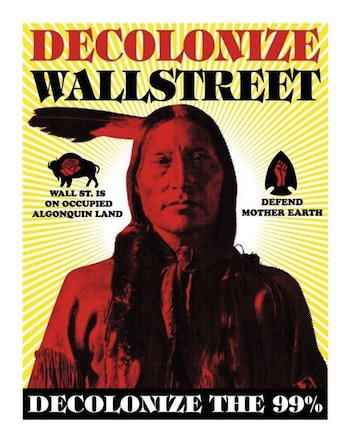 Some of us who watch in awe and delight at the incredible well of energy, perseverance, and hope of the Occupy Wall Street movement are getting word of anti-racist critiques of the language and organizing strategies, particularly around declarative statements released on the Occupy Wall Street website and dispersed to media outlets. It is important to note- as the organizers do- that “demand is a process” and the new day voice of the community-in-process emerges continually without necessarily being pinned down by the bulletin board messages of the passing day. The voices of people of color, it seems, are being heard and integrated, though not without the fearless contributions of people of color sometimes in the face of serious resistance. I want to highlight some of the discussion as it is occurring mainly through articles and online forums not, as some might fear, to disparage the movement but rather to learn from the anti-racism discussion in progress. For the sake of utmost transparency: I am a woman of color who approaches movement work predominantly led by white people with a hermeneutic of suspicion and, while I have gotten some word on the happenings in Occupy Boston, I have not gone to see what’s happening on the ground there since it officially started this past Friday. (I do plan to go down there with a faith community of which I’m a part sometime in October.) 11/2/2010 Season of Remembrance in a Season of Gratitude: The Wampanoag and the Gospel of HospitalityBy: Jocelyn Perry 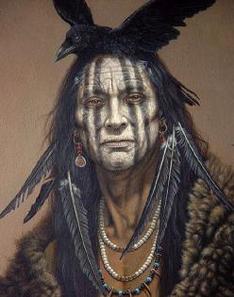 Recently tears came to my eyes as I began to read about the Trail of Tears. In 1830, the United States Congress passed the “Indian Removal Act” which was the catalyst for the Trail of Tears. The Trail of Tears was the forced disconnection and displacement of the Cherokee people from their ancestral homeland. The suffering and death of thousands of Cherokee women, children and men began in 1838. About 4,000 died on the long march over thousands of miles with minimal facilities and food. These sorts of injustices only deepened the great disaster of Western involvement in the “new world” as disease brought by Europeans and subsequent conscious efforts by the US government during the 1600s—1800s resulted in a culminated death of 10 to 30 million Native Americans people. As we approach Thanksgiving, the anarchist critique is vital. The anarchic critique calls us to take a hard look at the historic imperialistic behavior of the first European settlers and the US government against Native American people. Also, an anarchist perspective serves to critique aggressive approaches in missionary work pushing for the “conversion” of Native American peoples to Christianity. This season is not just a season of grateful celebration but also a season of remembrance, even a season of mourning, for the Native Americans. But in struggling with this paradox of celebration and remembrance we ask the question: how was Jesus’ living gospel of hospitality and gratitude embodied by the Native Americans during the First Thanksgiving? |
Disclaimer
The viewpoints expressed in each reader-submitted article are the authors own, and not an “official Jesus Radicals” position. For more on our editorial policies, visit our submissions page. If you want to contact an author or you have questions, suggestions, or concerns, please contact us. CategoriesAll Accountability Advent Anarchism Animal Liberation Anthropocentrism Appropriation Biblical Exegesis Book Reviews Bread Capitalism Catholic Worker Christmas Civilization Community Complicity Confessing Cultural Hegemony Decolonization Direct Action Easter Economics Feminism Heteropatriarchy Immigration Imperialism Intersectionality Jesus Justice Lent Liberation Theology Love Mutual Liberation Nation-state Nonviolence Occupy Othering Pacifisim Peace Pedagogies Of Liberation Police Privilege Property Queer Racism Resistance Resurrection Sexuality Solidarity Speciesism Spiritual Practices Technology Temptation Veganism Violence War What We're Reading On . . . White Supremacy Zionism ContributorsNekeisha Alayna Alexis
Amaryah Armstrong Autumn Brown HH Brownsmith Jarrod Cochran Chelsea Collonge Keith Hebden Ric Hudgens Liza Minno Bloom Jocelyn Perry Eda Ruhiye Uca Joanna Shenk Nichola Torbett Mark VanSteenwyk Gregory Williams Archives
October 2017
|
Search by typing & pressing enter

 RSS Feed
RSS Feed